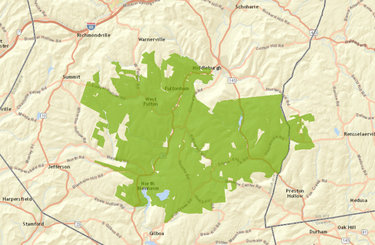A lucky few to get fast fiber-optic internet in Rensselaerville thanks to state grant
RENSSELAERVILLE — A few folks in the northwestern corner of this town have gotten lucky. Lucky, that is, if you consider having high-speed access to the internet via a fast wired broadband connection a good thing.
By geographical happenstance, households in the thinly populated area will have — or at least will be eligible to have — the amenity that some consider essential to modern life. And they should have it by the year 2020 or before.
Their location happens to be in the small portion of the town served by Middleburgh Telephone Company, known as Midtel. The company is the recipient of a $5,562,548 grant from the state’s New NY Broadband Program, established to bring high-speed broadband internet access to areas of the state with the lowest population density — areas that the program identifies as unserved or underserved.
Midtel sponsored an informational meeting at the Rensselaerville Town Hall on Dec. 12.
Big grant, big job
The state broadband program has disbursed a total of $54.2 million in the first phase of its three-phase largesse.
Midtel will use its $5.5 million grant — plus almost $1.4 million of its own money that the grant requires it to contribute — to string fiber optic cable along little-traveled roads in order to provide residents who live along them with internet download speeds of at least 25 megabits per second (or Mbps), according to the family-owned company.
Schoharie County is the fifth least populous county in New York State. The lion’s share of the project’s funding will go to five Schoharie County towns: Blenheim, Broome, Conesville, Fulton, and Gilboa.
Rensselaerville — the least populous among Albany County’s 10 towns — will get to share at least a little in the bounty. The Midtel website indicates that eligible homes in the Hilltown are found along Huntersland Road, Crystal Lake Road, Lake Road, and Wolf Road, among other roads that are served by the company in the three census blocks located due west of the Rensselaerville hamlet and just east of the Albany County/Schoharie county line.
Residents in the area can check if high-speed broadband is in their future by visiting the Midtel website midtel.net and entering their address in the search box on the site’s availability page. Or by calling the company.
Jim Becker, the company’s president, says 70 homes in Rensselaerville lie along the path of the fiber optic cable that will be ”overlashed” on top of the telephone lines the company owns on utility poles it half-owns. “We will go on top of what we already have there,” he says. No digging required.
He says the grant requires that the fiber optic cable to be all in place by the end of 2018. Once that’s done, home-by-home installations will begin. Becker says an average of 40 to 60 percent of homes offered such high-speed service nationally signup on average, but that rate can be higher in rural areas.
The speed of a fiber-optic network can be fast — as fast as one gigabit per second, far beyond what a typical home now needs, Becker says. But he also points out that household broadband consumption is “rising exponentially, doubling every 18 months.”
The grant requires his company to agree to provide at least 25 Mbps for less than $50 per month, but he expects the “package” ultimately offered may be even less than that. Tiered pricing will offer higher speeds for those who want it. He says typical speed will be better than available in many urban areas.
All told, over the next three years, Midtel will install more than 200 miles of fiber optic infrastructure, with the capacity to serve as many as 1,592 households in places that fall into the broadband program’s “unserved” category: “places where the fastest available advertised internet download speed offered by a wireline-based provider is less than 25 Mbps. “
According to the website Broadbandnow, 98 percent of the state’s residents have a wired broadband connection that delivers speeds of at least 25 Mbps. Another 400,000 are connected but at speeds below 25 Mbps. And another 108,000 have no wired connection at all.
Average statewide speed is 41.8 Mbps, according to Broadbandnow, which also says that New York is the fourth most connected state.
Midtel’s grant was one of 25 grants— and the second largest grant — awarded to 14 service providers across the state at the end of a “reverse auction”process from which those bidders that sought the least amount of state money per new-household-served emerged as the winners. The only larger grant, $1.7 million, was awarded to Frontier Communication for expanding broadband availability in the North Country.
Service in Westerlo
Mid-Hudson Cable, which is the internet service provider in Westerlo, also received a grant — almost $1 million — but for fixed wireless rather than for fiber-to-the-home. Fixed wireless broadband employs radio-wave transmission from a tower to the user’s antenna or satellite dish.
The Mid-Hudson grant was the only grant awarded for fixed wireless. All but one of the others were — like the Midtel grant —for fiber-to-the-home technology. The lone exception was for a hybrid wired/wireless expansion proposed by Heart of the Catskills Communications, a subsidiary of the Margaretville Telephone Company.
Rural communities often find it difficult to persuade internet service providers to extend service to roads where few people live.
The $7 million that will be expended to make high-speed Internet available to 1,592 households in the Midtel service area works out to a per-household cost of almost $4,400.
A broadband committee in Westerlo has been trying to push Mid-Hudson Cable to expand its infrastructure in the town or, failing that, to find another internet service provider more willing to make the town better connected. (See altamontenterprise.com.)
Companies often require a minimum population density that will ensure that the cost of expansion is offset by new income. The state broadband program is designed to overcome that hurdle.
“Looking at this project as a stand-alone,” Becker says, “it may not be a project we would do.” But the state help makes it doable, he said. “Long-term, the cost of maintaining the network is less and we can grow more services on copper.” He said it makes good financial sense for the company.
Midtel already has made its application for a phase-three grant. Becker says they had hoped to include additional Rensselaerville census blocks but that proved not feasible. “Maybe in Phase 3,” he said.
“This program is a real gamechanger,” Becker says, “I applaud the governor for it.”



